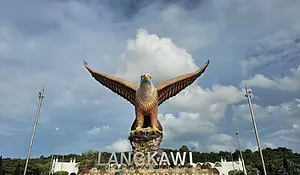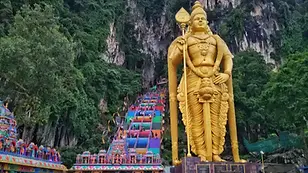

Malaysia: Sky Bridges, Street Food & Sacred Caves in a Tropical Nation
Your Guide to the Land of the Malay
Malaysia gave us a blend of modern city life and easy access to nature that felt refreshingly balanced. We spent time in Kuala Lumpur, exploring neighborhoods, food scenes, and everyday city rhythms, before heading to the Genting Highlands for a change of pace above the heat. Moving between urban streets and cooler mountain air offered a clear sense of Malaysia’s contrasts. This page brings together our firsthand experiences, destination highlights, and practical insights from traveling through Malaysia.
Quick Navigation
Share This Guide
Highlights from Our Journey
A visual snapshot of the places, culture, and experiences that shaped our travels across Malaysia.


Top Activities in Malaysia, Worth Booking Ahead
Some experiences in Malaysia are better booked in advance, especially iconic places like Batu Caves and Langkawi. These are a few trusted tours we’d personally recommend.
Powered by GetYourGuide
Interesting Facts
Here are 15 interesting facts about Malaysia. Some may just surprise you!
1. Malaysia is Made Up of Two Regions: Peninsular Malaysia and East Malaysia (on the island of Borneo) are separated by the South China Sea but form one country.
2. It’s One of the World’s Most Biodiverse Countries: Malaysia hosts some of the oldest tropical rainforests on Earth, with incredible plant and animal diversity.
3. Kuala Lumpur’s Petronas Towers Were Once the Tallest Buildings: These iconic twin towers were the tallest in the world from 1998 to 2004 and remain a symbol of modern Malaysia.
4. Malaysia Has Over 130 Ethnic Groups: The major groups are Malays, Chinese, and Indians, contributing to rich cultural diversity and festivals.
5. The Country is Famous for Its Street Food: Dishes like nasi lemak, char kway teow, and roti canai offer vibrant flavors that reflect its multicultural heritage.
6. Bahasa Malaysia is the Official Language: Malay is the national language, but English is widely spoken, especially in business and tourism.
7. Malaysia is a Leading Producer of Palm Oil: The country is one of the largest global exporters, which plays a major role in its economy.
8. The Rainforest of Taman Negara Is Over 130 Million Years Old: It’s one of the oldest rainforests in the world and offers jungle trekking and wildlife spotting.
9. Malaysia Celebrates a Variety of Festivals: Hari Raya, Chinese New Year, Deepavali, and Christmas are all public holidays, reflecting its cultural harmony.
10. The Orangutan Is Native to Malaysia: These endangered great apes live in the rainforests of Borneo and are a focus of conservation efforts.
11. Malaysia Has Some of the World’s Longest Caves: Mulu Caves in Sarawak stretch over 200 kilometers underground, attracting adventurers and scientists.
12. The Country Is Known for Beautiful Islands: Langkawi, Tioman, and the Perhentian Islands offer pristine beaches and marine biodiversity.
13. Malaysia has a Constitutional Monarchy: The Yang di-Pertuan Agong is the elected monarch who serves a five-year term, unique in the world.
14. The Klang Valley is the Economic Heart: This region around Kuala Lumpur is the country’s business and transportation hub.
15. Malaysia Is Making Strides in Renewable Energy: Solar power projects and sustainability initiatives are growing as the country balances development with conservation.
ADVERTISEMENT
Blogs & Guides
Thoughtful travel stories, practical guides, and real experiences from the road.
Travel Essentials
Travel Information for Malaysia: Practical Tips & Things to Know Before You Go.
Information About Malaysia
POPULATION
Around 33.5 million people live in Malaysia, with major population centers in Kuala Lumpur, Penang, and Johor Bahru.
CURRENCY
Malaysian Ringgit (MYR or RM). Credit cards are widely accepted in cities and malls, but cash is still preferred in smaller towns and at street stalls.
CAPITAL
Kuala Lumpur (1.98 m) is a cosmopolitan capital known for its skyline dominated by the Petronas Towers, vibrant food scene, and multicultural neighborhoods.
SPEED / DISTANCES
Urban Areas: 50 - 60 km/h
Rural Roads: 70 - 90 km/h
Motorways: 110 km/h
Speed cameras and police roadblocks are common, especially during festivals.
TIME ZONES
Malaysia Standard Time (MYT), UTC+8.
There is no daylight saving time.
DRIVING
Driving is on the left-hand side. Foreigners can drive with an International Driving Permit (IDP) with their valid home license.
ALCOHOL AGE
21 years old. Alcohol is available but mainly consumed by non-Muslim communities. Restrictions exist in certain states and during religious observances.
SMOKING AGE
18 years old. Smoking is banned in most indoor public spaces and at eateries. Enforcement is generally stricter in major cities.
Travel Resources
We rely on a set of trusted tools for transport, connectivity, insurance, and bookings while traveling full-time and living location-independent.
Over our many years of full-time travel, we've booked countless accommodations, flights, and activities while also navigating the world of earning online.
These are the tools we rely on to plan and book our adventures, and now, you can too!
YouTube
Discover the world with us. Join the Jenn & Leon YouTube channel.
MALAYSIA! 🇲🇾 Exploring the beautiful country of Malaysia for one month! Join us as we explore the islands and cities!
MALAYSIA! 🇲🇾 Exploring the beautiful country of Malaysia for one month! Join us as we explore the islands and cities!


FIRST TIME trying RAMLY BURGER in KUALA LUMPUR, MALAYSIA 🇲🇾 Is it really the BEST in THE WORLD!?

AMAZED by KUALA LUMPUR! Exploring Kuala Lumpur's Coolest Streets and Shops

McDonald's in MALAYSIA is INCREDIBLE! 🇲🇾 We've had McDonald's in 44 Countries!

Exploring Kuala Lumpur’s Coolest Bridge and Hidden Food Spots!
As entrepreneurs and full-time slow travelers, our goal is to see as much of this beautiful planet as we can!
By subscribing to our channel, you will get notified of our latest videos, so you will never miss out!
Country Guides
Essential travel tips, practical planning, and real experiences from the road.
Check out other comprehensive Country Guides with all you need to know before you go, including our latest posts, must-see places, fascinating facts, and key information about health & safety, transport, local customs, cuisine, connectivity, visa information, useful links, and much more!

Jenn & Leon at Closer Lives
Closer Lives was created to bring people, places, and stories closer together. Through travel, culture, history, poetry, and personal experience, we share the moments that shape how we see the world, and ourselves.
If you enjoy thoughtful travel guides, real experiences, and creative storytelling, you’re in the right place. You can also explore our Travel & Lifestyle Emporium, featuring inspirational travel pieces designed by us and shipped worldwide.
























































































